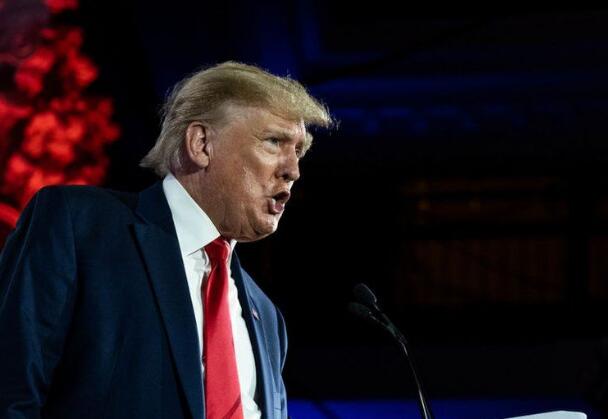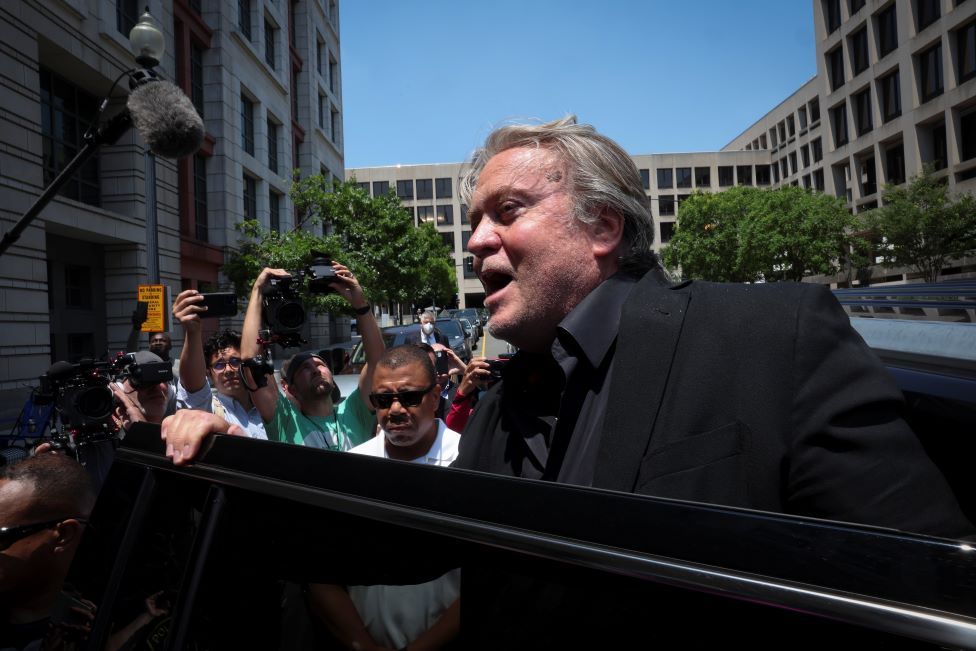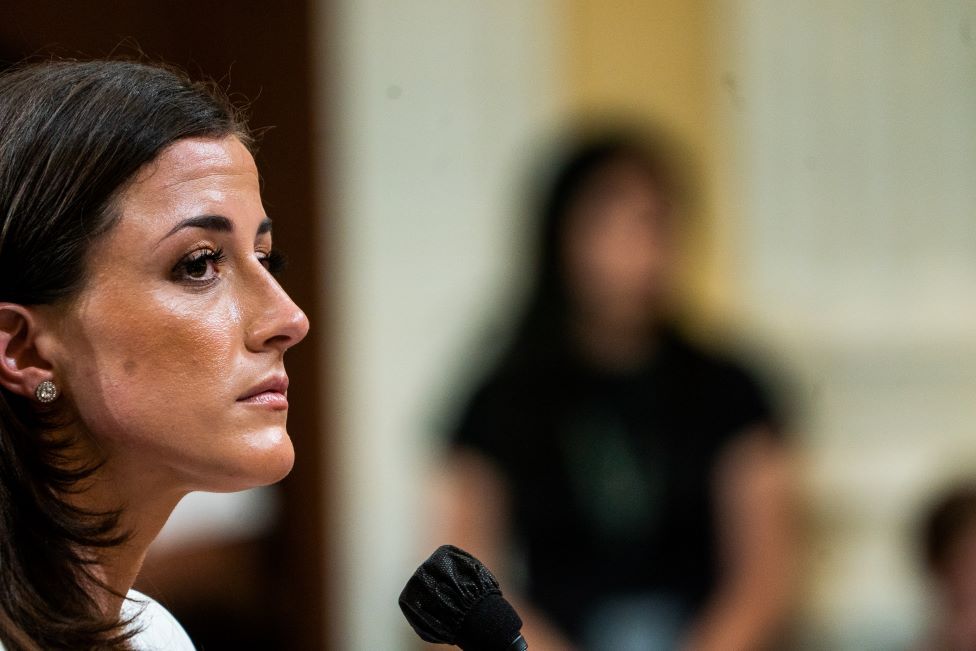
What looming US Capitol riot hearings might tell us
The congressional committee investigating the 6 January attack on the US Capitol is set to resume its hearing schedule this week, with an afternoon session on the violent extremist groups that participated in the Capitol breach.
It will be the seventh hearing conducted this year, and the first since the “emergency” session in which former White House aide Cassidy Hutchinson provided blockbuster testimony about Donald Trump’s activities on the day of the Capitol attack.
Here’s a look at where things stand at the moment – and what might be in store.
The extremists who led the charge
The 6 January hearings up to this point have focused considerable attention on how the committee believes Donald Trump and his advisers created a political climate after the 2020 election that set the stage for the Capitol attack. Tuesday’s hearing will take a closer look at two right-wing extremist groups – the Proud Boys and the Oath Keepers – who were moved to action. Their members, clad in military-style garb and body armour, were some of the first to breach the Capitol.
The committee, led by two lawmakers, Jamie Raskin of Maryland and Stephanie Murphy of Florida, will detail the plans these militant groups made for 6 January and explore some of the connections they had to advisers close to the president, including former National Security Adviser Michael Flynn and longtime Trump confidant Roger Stone.
- Ex-aide paints devastating picture of Trump
Of particular interest to the committee is an 18 December Merrell Shoes For Women White House meeting involving the president, Mr Flynn and Trump lawyers Rudy Giuliani and Sidney Powell – which was followed the next day by a presidential tweet exhorting his supporters to come to Washington on 6 January for a rally that would “be wild”.
Mr Raskin told BBC US partner network CBS News that the meeting and the tweet had an “explosive” effect on violent elements of Mr Trump’s political base.
Steve Bannon’s gambit
Steve Bannon has long been high on the 6 January committee’s list of people it wants to interview. He’s also long been resistant to those efforts, along with accompanying document subpoenas, to the point of being held in contempt of Congress, a charge for which he has been indicted by the US justice department.
Now, it appears, Mr Bannon is willing to talk.
Mr Trump’s former senior White House adviser and 2016 campaign chairman was a central figure in the effort to overturn the 2020 election results, whose intricacies he discussed in detail on his popular podcast. In the days before the Capitol attack, he also made increasingly ominous warnings about how “all hell is going to break loose” on 6 January, framing the protests as a battle against “the forces of darkness”.
 IMAGE SOURCE,GETTY IMAGES
IMAGE SOURCE,GETTY IMAGESMr Bannon may be able to provide information about communications between the militant groups at the rally and White House officials or shed light on the organisations that were funding the 6 January rally and the months-long attempts to undermine the 2020 election.
Initially, Mr Bannon claimed he was not permitted to talk with the committee because his conversations with Mr Trump and others at the White House were covered by “executive privilege”, a legal protection that allows presidents to receive candid advice from their aides. Over the weekend, however, the former president waived that protection, encouraging Mr Bannon to speak.
There’s still no guarantee that will happen, however, as the committee may be reluctant to agree to Mr Bannon’s request to testify live, and not in a recorded deposition. And even if he were to appear, he may still claim a constitutional right to avoid being compelled to incriminate himself – a strategy employed by several former Trump aides.
Cipollone’s front-row seat
While efforts to speak with Mr Bannon are still up in the air, on Friday the committee members landed another long-sought interview when they sat down behind Keen Shoes For Women closed doors with Mr Trump’s former White House counsel, Pat Cipollone.
According to a statement released by the committee, Mr Cipollone provided “critical testimony on nearly every major topic in its investigation, reinforcing key points regarding Donald Trump’s misconduct and providing highly relevant new information”.
Testimony from previous committee witnesses place Mr Cipollone among those at the White House fighting against what they saw as the excesses of some of the president’s advisers in challenging the 2020 election results.
The committee also reportedly asked Mr Cipollone about Mr Trump’s efforts to pressure Vice-President Mike Pence to block certification of Joe Biden’s presidential victory and attempts by some Trump supporters to receive presidential pardons after the 6 January attack.
Expect to see video excerpts of this testimony at Tuesday’s hearing.
The journey so far
The 6 January committee hearings began with a flurry questions about the purpose of the whole undertaking. Could the investigation reveal any new information on a story that had been explored in detail for more than a year? Would the public care? Would the hearings make any difference?
The answers, at least so far, are: Yes, yes and we’ll see.
The committee’s work proved to be meticulously gathered and presented in a cohesive narrative. That’s a reflection not only of the unanimity within the bipartisan committee about the goal of their work – to lay the Capitol attack at the feet of Mr Trump and his efforts to undermine the 2020 election results – but also the television-friendly format employed, with video clips and live testimony woven together.
- Four things we’ve learned from Jan 6 hearings
The members began by presenting evidence that Mr Trump knew that his election fraud claims were baseless – that he had been told so by his closest aides – but pressed ahead with his multifaceted effort to challenge the results anyway. This was then capped off by Ms Hutchinson’s dramatic testimony, during which the close aide to former White House Chief of Staff Mark Meadows recounted how the president knew that members of his “Stop the Steal” rally Birdies Shoes crowd were armed and that he was furious he couldn’t personally travel to the Capitol with his supporters.
Ms Hutchinson’s appearance provided the kind of unscripted drama that the hearings had been lacking up to that point.
What comes next
As recently as this weekend, it appeared the committee’s hearings were set on Thursday to conclude as they began – with a big-picture evening session televised on all the major commercial networks.
By Monday afternoon, however, Thursday’s hearing – which had never been officially scheduled – was quietly scrubbed. It could be a sign a Bannon appearance is in the works or that other witnesses have come forward to testify.
There’s also the unresolved matter of committee witness tampering, hinted at by Republican Liz Cheney at the end of Ms Hutchinson’s testimony. New hearings could delve further into those details.
 IMAGE SOURCE,GETTY IMAGES
IMAGE SOURCE,GETTY IMAGESThe committee had tentatively planned to release its formal report in September, when it might hold more hearings to present its findings and recommendations. That timeline, however, is still decidedly up in the air.
August is typically a dead month in Washington, as members of Congress head back to their home districts to meet with constituents. Ms Cheney, who has earned the white-hot scorn of the former president, is in a particularly delicate situation in that regard, as she faces a Republican primary challenge from a Trump-backed conservative on 16 August.
There is no set deadline for the committee to finish its work, although with midterm congressional elections looming in November and the prospect that Republicans could take over the House of Representatives in January and terminate the committee’s authorisation, the clock is definitely ticking.
Comments (0)